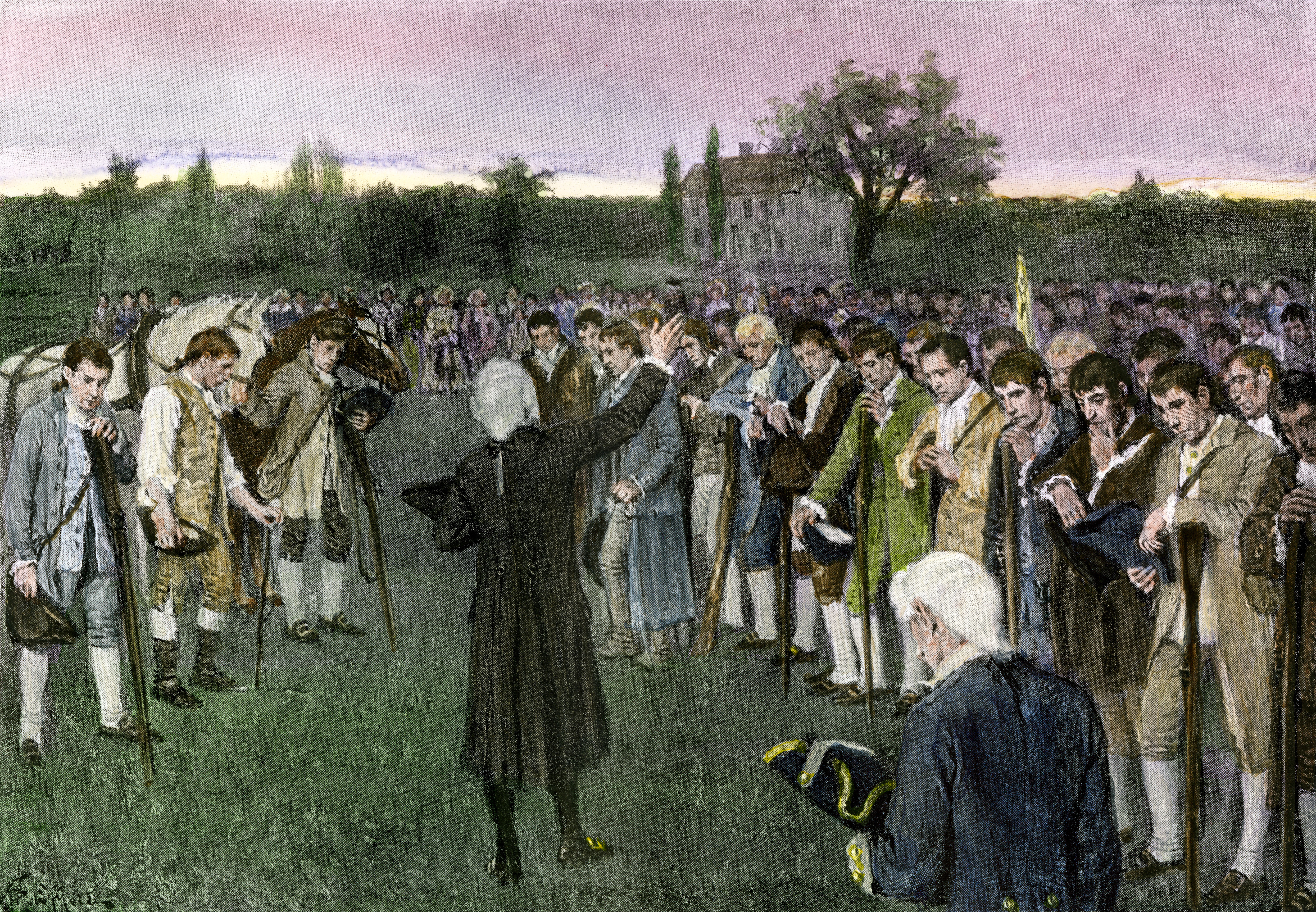How Alexander Hamilton solved America's gun problem — 228 years ago
The case for well-regulated militias


A free daily email with the biggest news stories of the day – and the best features from TheWeek.com
You are now subscribed
Your newsletter sign-up was successful
So many Americans are slaughtered by gun violence that even the most sensitive of us has grown numb to some degree. An Islamic extremist turns a gay nightclub into a grisly abattoir and we all know what comes next: nothing.
Regardless of your position on guns, two facts are beyond dispute: The National Rifle Association as a lobby is sufficiently powerful to stop confiscation laws dead in their tracks; and the astounding number of guns in America means even that if every gun manufacturer folded tomorrow, generations of Americans would still live in a nation awash in instruments of death, whether said death is directed at animals, intruders, or innocents.
These two facts were best confirmed by President Obama, who said during a townhall meeting earlier this month that "the notion that I, or Hillary, or Democrats, or whoever you want to choose, are hell-bent on taking away folks' guns is just not true, and I don't care how many times the NRA says it. I'm about to leave office. There have been more guns sold since I've been president than just about any time in U.S. history. There are enough guns for every man, woman, and child in this country and at no point have I ever proposed confiscating guns from responsible gun owners."
The Week
Escape your echo chamber. Get the facts behind the news, plus analysis from multiple perspectives.

Sign up for The Week's Free Newsletters
From our morning news briefing to a weekly Good News Newsletter, get the best of The Week delivered directly to your inbox.
From our morning news briefing to a weekly Good News Newsletter, get the best of The Week delivered directly to your inbox.
This is true.
So what can be done?
The answer is right there in the the Second Amendment, unchanged since it first flowed from the quill of James Madison: "A well regulated Militia, being necessary to the security of a free State, the right of the people to keep and bear Arms, shall not be infringed."
Ask yourself: For what purpose did the Framers endow militias with such a special place in the Bill of Rights?
A free daily email with the biggest news stories of the day – and the best features from TheWeek.com
The Federalist Papers assert that local militias (as opposed to a "regular army, fully equal to the resources of the country") exist as a formidable check on federal power. In Federalist 46, Madison writes of the local militia versus a national military:
It may well be doubted, whether a militia thus circumstanced could ever be conquered by such a proportion of regular troops. Those who are best acquainted with the last successful resistance of this country against the British arms, will be most inclined to deny the possibility of it. Besides the advantage of being armed, which the Americans possess over the people of almost every other nation, the existence of subordinate governments, to which the people are attached, and by which the militia officers are appointed, forms a barrier against the enterprises of ambition, more insurmountable than any which a simple government of any form can admit of. [Federalist 46]
Bearing arms is "the right of the people" who would make up a state militia, which protects us from national tyranny (even if Madison was overly generous in describing the efficacy of militiamen during the Revolutionary War). In Federalist 29, published 228 years ago, in 1788, Alexander Hamilton concurs as to why militias are necessary:
If circumstances should at any time oblige the government to form an army of any magnitude that army can never be formidable to the liberties of the people while there is a large body of citizens, little, if at all, inferior to them in discipline and the use of arms, who stand ready to defend their own rights and those of their fellow-citizens. This appears to me the only substitute that can be devised for a standing army, and the best possible security against it, if it should exist. [Federalist 29]
People need firearms proficiency to defend against young soldiers of a standing army who might be, in Madison's words, "rendered subservient to the views of arbitrary power." Hamilton also elaborates on ideas that would later lead to the Second Amendment, and particularly the notion of a well-regulated militia. He is unambiguous in Federalist 29 on the point that people have a right to their weapons, and that they need not attend formal military training to be part of a militia, which would be "as futile as it would be injurious, if it were capable of being carried into execution. A tolerable expertness in military movements is a business that requires time and practice. It is not a day, or even a week, that will suffice for the attainment of it."
By definition, then, a "well-regulated militia" would no longer seem to include the National Guard, which does require formal and sustained military training by the regular Army. At any rate, in its present incarnation, the Guard — as we saw in Iraq and Afghanistan — is a "state" force in name only. In practice, it is a part-time Army Reserve: a national army that happens also to be used for natural disasters in home states.
Hamilton writes further of the requirements of militia members:
Little more can reasonably be aimed at, with respect to the people at large, than to have them properly armed and equipped; and in order to see that this be not neglected, it will be necessary to assemble them once or twice in the course of a year. [Federalist 29]
So: If the whole point of the keeping and bearing of arms is to stock "well-regulated militias," why not mandate militia membership in order to own a gun?
Before this suggestion is dismissed out of hand, I assert that the extremist so-called "militias" in Oregon, Ohio, and elsewhere — these people who live on compounds and confront federal agents — are not militiamen but rather insurrectionists. Insurrectionists should be excluded from this discussion. They surrender any claim to the designation "militia" and any place in civil society.
Proper militias would be comprised of sane men and women who own guns and wish to comply with state law. (And that is key: Militias belong entirely to the states, who regulate them accordingly.) Militias might be formed voluntarily based on like-mindedness and geography. Never forgetting their purpose — the common defense — hunters in north Louisiana, for example, might form their own militia — which in practice would exist as a kind of society or association. State regulation of militias would seek to prevent the radicalization of any such group and thus suppress insurrectionists. Likewise, state laws and local governance from within a militia might find better luck in implementing piecemeal the gun reforms that confound federal legislatures.
Recall Hamilton's statement of fact that in order to be "well regulated," a militia should meet once or twice a year. This is key to a militia-based reform (as opposed to an arms-based one) and could easily be accomplished. Precedent exists for large groups of people to assemble for one or two days a year to fulfill a civic obligation, and local governments are quite good at making such assemblies happen, as anyone who has ever been called to jury duty can attest.
Because, as Hamilton writes, formal military training would entail "a real grievance to the people, and a serious public inconvenience and loss," how might these militias spend their two days of annual assembly? How about using those days as opportunities for gun safety training. Why not bring the NRA to said meetings to conduct such training? Their political activities aside, the NRA is peerless with respect to teaching such classes. This also allows militia members to "feel each other out" and police one another, as all communities and associations are wont to do.
As militias would be geography based, members directly and through degrees of separation would run invariably across one another's Facebook profiles and the like. A monster like Dylann Roof, for example, might attract added attention with his pro-apartheid regalia, gun poses, burning American flags, and Confederate flag fixation. His friends might not care — and might well have similar beliefs — but a group of sane gun owners familiar with the consequences of inaction might be more willing to keep an eye on the guy and flag him to local law enforcement. Likewise Omar Mateen — not because of his name, religion, or skin color, but because he beat his wife and was reared by an unhinged video podcaster preaching pro-Taliban propaganda. Anyone who grew up in a small community knows: Fair or not, word of such things gets around. And a militia, as it were, would be just such a community.
This might not have directly prevented the massacres committed by Mateen or Roof or Adam Lanza. The simple disruption (or rather: restoration) of what it means to own a firearm, however, might well prevent future horrors. Gun owners would be given a vested interest in keeping firearms out of the wrong hands: pride in their militia. Can there be a greater dishonor than an atrocity like the massacre in Orlando? It is a national stain, make no mistake. But if the perpetrator was the member of a local militia, the shame becomes local, and with that, a certain urgency to make sure it doesn't happen.
The result of compulsory militia membership for gun owners is actual reform whose design originates directly from the framers of the Constitution. This reform adds oversight, training, and state regulation while keeping the federal government out (militias existing specifically as a check on federal power); preserving the right to keep firearms; contributing perhaps to the security of the United States in some presently unimaginable future conflict at home that involves enemy divisions and open warfare; and has a better chance of seeing law than does confiscation or a repeal of the right to bear arms.
Court precedents work against this argument. But courts change, and new eyes will inevitably be set upon the Second Amendment. Still, I concede that the likelihood of this proposal ever surviving the gauntlet of our legislative process to be slim at best. I would consider a small chance of taking a first step in the right direction, however, to be preferable to the nothing that followed the unimaginable wholesale slaughter of first-graders at Sandy Hook. If the prevailing arguments against gun ownership could survive that unrivaled atrocity, which was conceived by a lunatic and doled out from the barrel of a rifle, then those arguments will simply never gain traction. I mean only to submit other strategies to the public debate. I hope others do as well.
David W. Brown is coauthor of Deep State (John Wiley & Sons, 2013) and The Command (Wiley, 2012). He is a regular contributor to TheWeek.com, Vox, The Atlantic, and mental_floss. He can be found online here.
-
 What is the endgame in the DHS shutdown?
What is the endgame in the DHS shutdown?Today’s Big Question Democrats want to rein in ICE’s immigration crackdown
-
 ‘Poor time management isn’t just an inconvenience’
‘Poor time management isn’t just an inconvenience’Instant Opinion Opinion, comment and editorials of the day
-
 Bad Bunny’s Super Bowl: A win for unity
Bad Bunny’s Super Bowl: A win for unityFeature The global superstar's halftime show was a celebration for everyone to enjoy
-
 The billionaires’ wealth tax: a catastrophe for California?
The billionaires’ wealth tax: a catastrophe for California?Talking Point Peter Thiel and Larry Page preparing to change state residency
-
 Bari Weiss’ ‘60 Minutes’ scandal is about more than one report
Bari Weiss’ ‘60 Minutes’ scandal is about more than one reportIN THE SPOTLIGHT By blocking an approved segment on a controversial prison holding US deportees in El Salvador, the editor-in-chief of CBS News has become the main story
-
 Has Zohran Mamdani shown the Democrats how to win again?
Has Zohran Mamdani shown the Democrats how to win again?Today’s Big Question New York City mayoral election touted as victory for left-wing populists but moderate centrist wins elsewhere present more complex path for Democratic Party
-
 Millions turn out for anti-Trump ‘No Kings’ rallies
Millions turn out for anti-Trump ‘No Kings’ ralliesSpeed Read An estimated 7 million people participated, 2 million more than at the first ‘No Kings’ protest in June
-
 Ghislaine Maxwell: angling for a Trump pardon
Ghislaine Maxwell: angling for a Trump pardonTalking Point Convicted sex trafficker's testimony could shed new light on president's links to Jeffrey Epstein
-
 The last words and final moments of 40 presidents
The last words and final moments of 40 presidentsThe Explainer Some are eloquent quotes worthy of the holders of the highest office in the nation, and others... aren't
-
 The JFK files: the truth at last?
The JFK files: the truth at last?In The Spotlight More than 64,000 previously classified documents relating the 1963 assassination of John F. Kennedy have been released by the Trump administration
-
 'Seriously, not literally': how should the world take Donald Trump?
'Seriously, not literally': how should the world take Donald Trump?Today's big question White House rhetoric and reality look likely to become increasingly blurred
